How do you respond when you fail at something you have tried? How do you feel if you get a bad grade?  What do you think when you are having trouble accomplishing something new and challenging? What are your attitudes about failure?
What do you think when you are having trouble accomplishing something new and challenging? What are your attitudes about failure?
For many years, this has been an interest of Dr. Carol Dweck, a professor of psychology at Stanford University. Dweck has concluded that people have one of two kinds of mindsets when they are dealing with challenges or failure. She calls them a fixed mindset and a growth mindset, and they relate to where you believe ability comes from.
Those who have a fixed mindset believe that their intelligence, talents and skills are innate, and therefore they are fixed, as if carved in stone. Those with a fixed mindset believe that either you’re born smart or talented, or you’re not; that you have a certain, fixed amount of talent or skill, and that’s all you get. 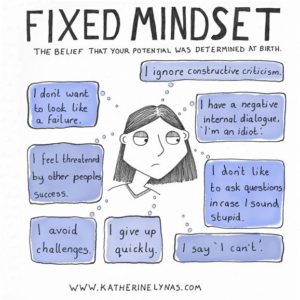 Those with a fixed mindset, then, strive for success and try to avoid failure, so they can maintain the belief that they have enough intelligence or talent. For those with a fixed mindset, failure means that you don’t have the necessary ability, or enough skill, to accomplish what needs to be done.
Those with a fixed mindset, then, strive for success and try to avoid failure, so they can maintain the belief that they have enough intelligence or talent. For those with a fixed mindset, failure means that you don’t have the necessary ability, or enough skill, to accomplish what needs to be done.
People with a fixed mindset believe that having to work hard is a sign of a lack of intelligence. They avoid challenges, give up easily when faced with obstacles, are upset by constructive criticism, and may feel bad when comparing themselves to others, who they see as having the abilities that they don’t. Because they want to look good, and not show their lack of ability to others, they hide their failures. A person with a fixed mindset is very hesitant to go ask for help, because they don’t want others to know about their lack of ability. They say to themselves, “People will laugh at me for thinking that I had talent.” or “Now I’ve gone and shown everyone how stupid I really am.”
Those with a growth mindset believe that talents and abilities can be developed through efforts, strategies that you try, and help and instructions from others. A growth mindset leads you to believe that 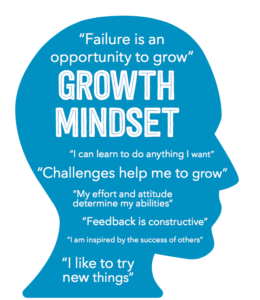 everyone can grow and develop, and that challenging yourself and making mistakes are a natural way to learn. The person with a growth mindset believes that, if you work at it, practice, or get some help, you can improve your performance. They are not afraid of failure, because it is just a signal that it is time to put in more effort, or practice.
everyone can grow and develop, and that challenging yourself and making mistakes are a natural way to learn. The person with a growth mindset believes that, if you work at it, practice, or get some help, you can improve your performance. They are not afraid of failure, because it is just a signal that it is time to put in more effort, or practice.
People with a growth mindset see mistakes and failures as a natural part of the learning process, and believe that the necessary skills can be acquired if you don’t already have them. They believe that, through persistence, they can improve, so endure in the face of difficulty , seeing effort as the way to mastery . Those with a growth mindset will try to learn from constructive criticism, and look to successful others for inspiration. They understand that the road to success can be a bumpy one, with ups and downs. They say to themselves, “Of course, I’m not good at it. I’ve never learned it” or “This is hard, so it’s going to take me a while to figure it out.” or “I’m going to need some help with this one.”
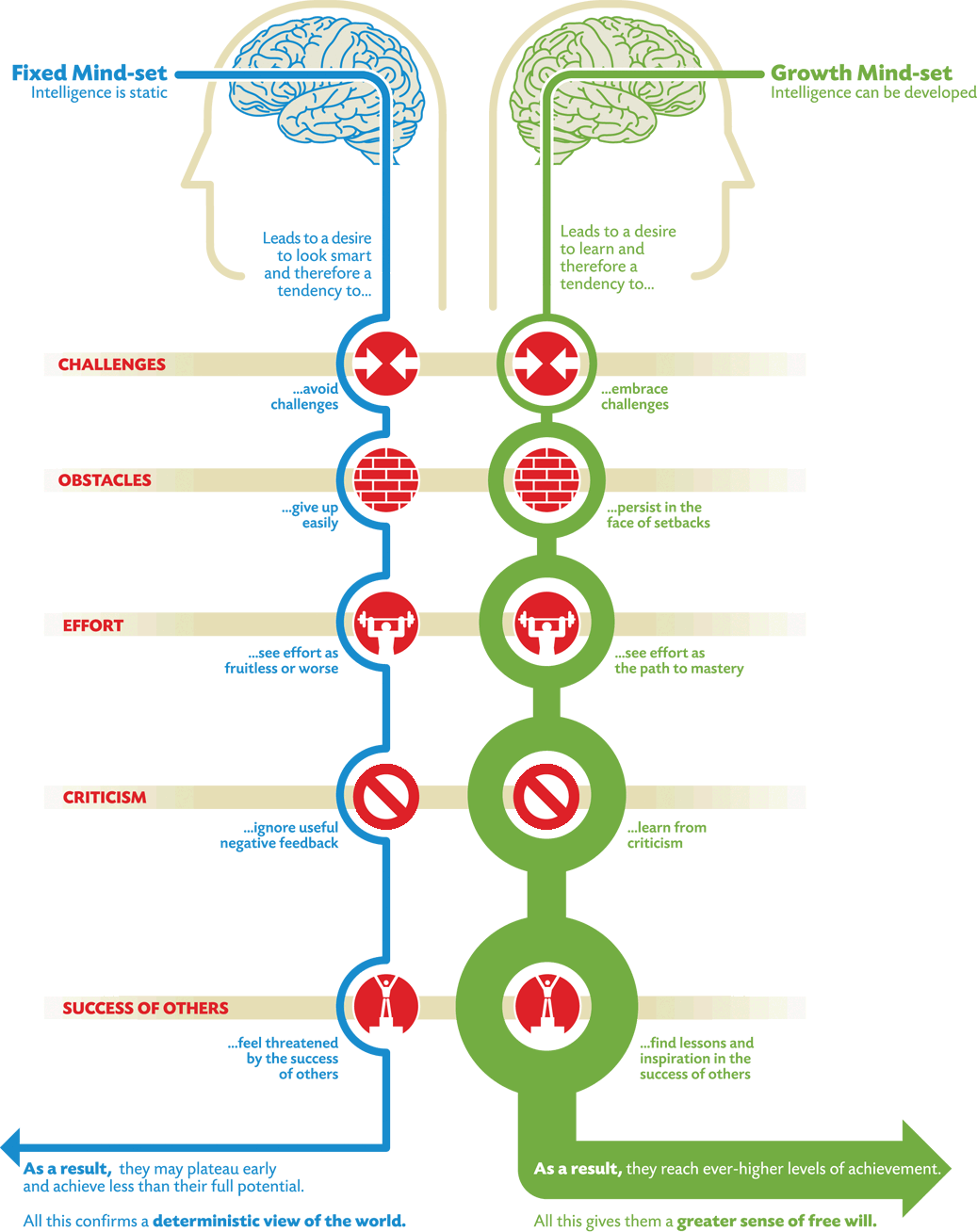
Dweck believes that a person’s mindset can be changed from fixed to growth (although nobody has a growth mindset in everything all the time), and that a growth mindset will lead to increased motivation and achievement. She has some suggestions for changing your mindset.
- Be on the lookout for statements that indicate a fixed mindset. “I’m not smart enough to do this.” “Everyone else is better than me.” Fixed mindsets are often triggered by tasks that are challenging or outside of our comfort zone. It is much more helpful to think of something more motivating and encouraging to tell yourself.
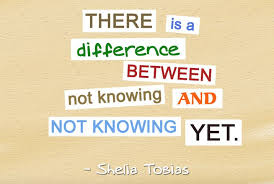 One thing that Dweck suggests as a way to challenge a fixed mindset is to use the “power of YET”. If you are having trouble understanding or accomplishing something, instead of telling yourself “I can’t do this”, say “I can’t do this YET”. Allow yourself the gift of time, giving yourself more time to figure it out. This is a reminder to persevere and figure out how you can do it. Those with a growth mindset aren’t deterred by their problems because they believe that they just haven’t solved them YET.
One thing that Dweck suggests as a way to challenge a fixed mindset is to use the “power of YET”. If you are having trouble understanding or accomplishing something, instead of telling yourself “I can’t do this”, say “I can’t do this YET”. Allow yourself the gift of time, giving yourself more time to figure it out. This is a reminder to persevere and figure out how you can do it. Those with a growth mindset aren’t deterred by their problems because they believe that they just haven’t solved them YET.- Take risks, accept failures, learn from mistakes. Understand that if you don’t learn to fail, you may fail to learn. Many successful people have had many experiences of failure and rejection. For
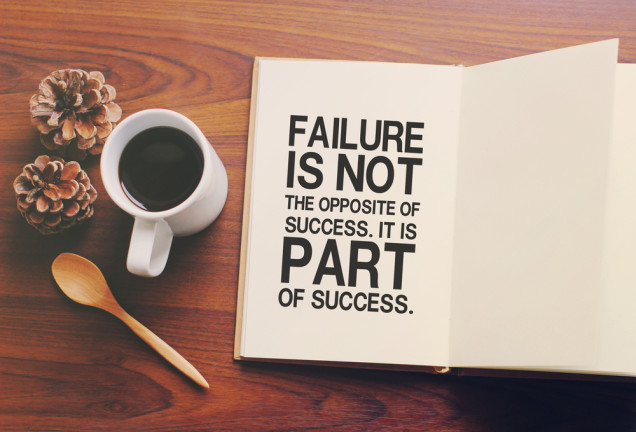 example, James Dyson, the billionaire inventor of the bagless Dyson vacuum cleaner had 5,127 failed attempts over 15 years before he successfully came up with his first model that worked. In his words, “These were tough times, but each failure brought me closer to solving the problem. It wasn’t the final prototype that made the struggle worth it. The process bore the fruit. I just kept at it.” On the other hand, . many of life’s failures are people who did not realize how close they were to success when they gave up.
example, James Dyson, the billionaire inventor of the bagless Dyson vacuum cleaner had 5,127 failed attempts over 15 years before he successfully came up with his first model that worked. In his words, “These were tough times, but each failure brought me closer to solving the problem. It wasn’t the final prototype that made the struggle worth it. The process bore the fruit. I just kept at it.” On the other hand, . many of life’s failures are people who did not realize how close they were to success when they gave up. - Don’t give up, but don’t keep doing the same thing that doesn’t work. Figure out new strategies, think about where you can go for help, figure out what resources you can take advantage of. Hard work, good strategies and good use of resources will result in better learning.
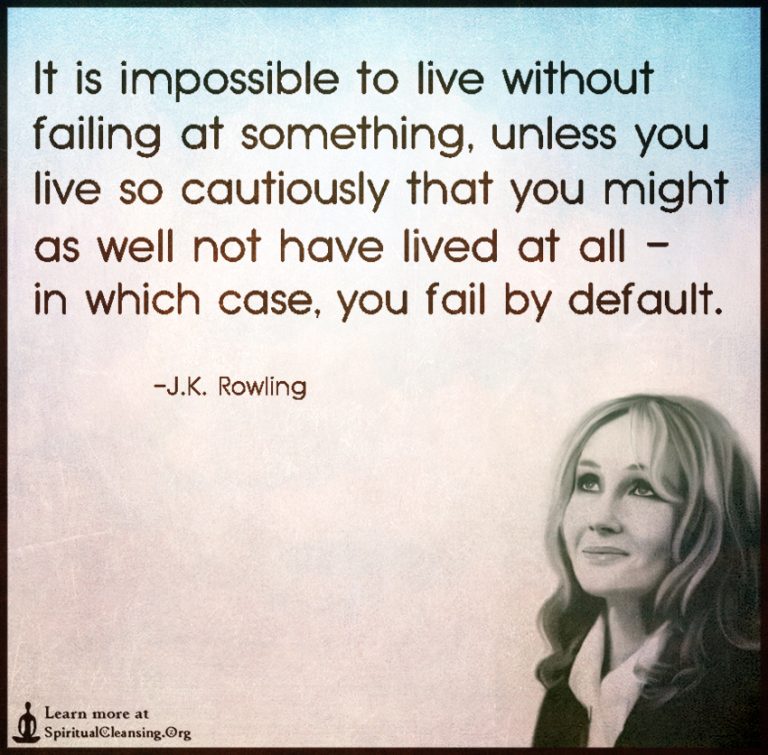
Take care, and work on developing a growth mindset.
Rhonda Gilby


